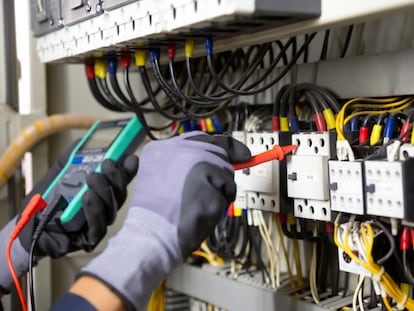Cable sobre el mensaje de Mohamed VI tras la visita a Ceuta y Melilla de los Reyes de España
Embajada de EE UU: "La estridente reacción pública [en Marruecos] fue probablemente exacerbada". "En Marruecos la agitación de los sentimientos nacionalistas es una táctica para distraer la atención de los asuntos internos"
| ID: | 129107 |
| Date: | 2007-11-07 15:19:00 |
| Origin: | 07RABAT1706 |
| Source: | Embassy Rabat |
| Classification: | CONFIDENTIAL |
| Dunno: | 07MADRID2070 07RABAT1695 |
| Destination: | VZCZCXRO0477 PP RUEHBC RUEHDE RUEHKUK RUEHROV DE RUEHRB #1706/01 3111519 ZNY CCCCC ZZH P 071519Z NOV 07 FM AMEMBASSY RABAT TO RUEHMD/AMEMBASSY MADRID PRIORITY 5834 RUEHC/SECSTATE WASHDC PRIORITY 7711 INFO RUEHEE/ARAB LEAGUE COLLECTIVE RUEHBS/AMEMBASSY BRUSSELS 3119 RUEHLI/AMEMBASSY LISBON 1205 RUEHLO/AMEMBASSY LONDON 3441 RUEHFR/AMEMBASSY PARIS 4831 RUEHCL/AMCONSUL CASABLANCA 3652 |
C O N F I D E N T I A L SECTION 01 OF 02 RABAT 001706 SIPDIS SIPDIS STATE FOR NEA/MAG E.O. 12958: DECL: 11/07/2017 TAGS: PREL, MO, SP SUBJECT: MOROCCO: MONARCH CRITICIZES BUT EXTENDS HAND TO SPANISH COUNTERPART REF: A. RABAT 01695 B. MADRID 02070 Classified By: Classified by Charge d'Affairs Robert P. Jackson for rea sons 1.4 (b) and (d) ------- Summary ------- 1. (C) On November 6 Morocco's King Mohammed VI criticized Spain over the visit of King Juan Carlos to the disputed enclaves of Ceuta and Melilla, but called for "honest and forward-looking dialogue", sending a clear message that the relationship will be preserved. Moroccans across the political spectrum have reacted stridently to the November 5 and 6 visits to the coastal cities. Prime Minister Abbas El-Fassi made a strong speech to Parliament and there were protests and sit-ins by senior government officials, NGOs, and parliamentarians. Morocco postponed the annual bilateral PM-chaired coordination meeting indefinitely. Foreign Affairs Committee Chair Fouad Ali El Himma presented a protest letter to the Spanish Ambassador on October 6. This nationalist grandstanding increased the profile of both PM El Fassi and El Himma in the royal domain of Foreign Affairs. Exacerbated by inopportune timing on the eve of Morocco's Green March celebration, the visit raised political tensions, but has not so far appeared to have fired the public imagination. It is likely the flurry of Moroccan anger will not set back burgeoning relations across the straits of Gibraltar. End Summary. ----------------------------- Irked, but Calming the Waters ----------------------------- 2. (U) Press reports indicate that on November 6, royal adviser Mohammed Moatassim read a statement from King Mohammed VI to the Moroccan cabinet. In it, the monarch condemned the recent visit by Spain's King Juan Carlos to the disputed Spanish enclaves of Ceuta and Melilla on Morocco's northern coast as "useless" and a sign of "yearning for a long-gone era of darkness." (Note: Morocco does not recognize Spanish sovereignty over the two enclaves. End Note.) He reiterated his resolve to reassert Moroccan sovereignty over the territories, which have been under Spanish rule for approximately 500 years. He closed, however, by calling for an "honest and forward-looking" dialogue in order to continue building constructive relations between the two countries. ------------------------------------ Fired by Memories of the Green March ------------------------------------ 3. (U) On November 5, the day of the visit, a group of parliamentarians, NGO representatives, local government officials and hundreds of protesters marched on the border crossing between Morocco and the Spanish enclave of Melilla An even larger crowd (some press estimates put the number of people at 5,000) demonstrated uneventfully at the border with Ceuta. The march was organized to protest both Juan Carlos's visit and the continued "colonization" of Moroccan territory by Spain. This event followed similar, but relatively small, peaceful protests outside the Spanish Consulates in Tetouan, Agadir and Casablanca. 4. (U) In Rabat, also on November 5, a 10-person delegation headed by the Chairs of the parliamentary Foreign Affairs Committees (FAC) from the chambers of Councilors (upper house) and Deputies (lower house), under the leadership of Deputies' FAC Chair Fouad Ali El Himma, "demarched" the Spanish Ambassador in his own Embassy. 5. (C) A Spanish poloff told us that Al Himma personally transmitted a parliamentary letter of protest to the Ambassador during a surprisingly cordial meeting. He was accompanied by the heads of the major parliamentary caucuses, including the Party of Justice and Development (PJD). The Spanish Embassy told us that the letter repeated political leaders' call for Spain to re-evaluate the status of the enclaves and criticized the King's visit as provocative and RABAT 00001706 002 OF 002 inopportune. ---------------------------------- A Calculated Spanish Miscalculation? ---------------------------------- 6. (C) Other Spanish emboffs told us that the Government of Spain (GOS) knew that King Juan Carlos's visit would lead to a strong Moroccan reaction, but that Spanish electoral imperatives played a role in the decision to send him to the enclaves. The King had been under pressure from separatists on the one hand and grumbling from the military on the other. At the same time, Prime Minister Zapatero, who faces re-election in March 2009, calculated that the domestic electoral boost he would receive from the king's journey outweighed the damage it would do to bilateral relations. Additionally, Madrid believed that Spanish/Moroccan relations were the strongest they had ever been and that they would weather the storm. They maintained the visit by Crown Prince Felipe and Foreign Minister Moratinos on October 30 was actually an opportunity for Moratinos to give the Fassi government advance notice and sound out their reaction. At the time, Moroccan Foreign Minister Fassi-Fihri assured the Spanish of overall "business as usual." Nevertheless the strength of the response caught the Spanish diplomats here off guard. In one initial first consequence, the Moroccan MFA announced that the annual high-level coordination meeting, chaired by the two countries' respective Prime Ministers, was "unlikely to occur." ---------------------- Remember the Melilla ---------------------- 7. (C) Our Spanish contacts felt that the widespread "manufactured outrage" and "orchestrated" demonstrations outside Spanish missions and the two enclaves were a sign of the Fassi government's weakness. The limping parliament seized on this issue to whip up the winds of Moroccan nationalism and gain legitimacy in the eyes of a jaundiced electorate. They said that complaints by the unpopular Prime Minister El Fassi, that the visits "hurt Moroccans feelings," were an effort to distract from his own short-comings. ------- Comment ------- 8. (C) The strident and visible public reaction was likely exacerbated because the Juan Carlos visit came on the eve of annual celebrations commemorating the Green March, the date on which Hassan II sent 20,000 Moroccans into the desert to "liberate" the Western Sahara from Spain. In Morocco at least, we note that stirring up nationalistic feelings to distract from domestic concerns has long been a tactic of the kingdom's leaders. It was used by both Prime Minister El Fassi and Fouad Ali El Himma to strengthen their nationalist and foreign policy credentials. Neither the Prime Minister nor parliament have had much prior role in foreign affairs, a preserve of the throne. 9. (C) The theatrics of the Moroccan response could end up benefiting Juan Carlos and Zapatero as they face the Spanish right. We assess that Mohammed VI's comments are a signal to the Moroccan side to reduce the rhetoric and histrionics and begin moving past the issue. We concur with our Spanish colleagues that there likely will be little long-term effect on relations. End Comment. ***************************************** Visit Embassy Rabat's Classified Website; http://www.state.sgov.gov/p/nea/rabat ***************************************** Jackson |
Traducción automática. Puede que el texto traducido no sea fiel al original
Tu suscripción se está usando en otro dispositivo
¿Quieres añadir otro usuario a tu suscripción?
Si continúas leyendo en este dispositivo, no se podrá leer en el otro.
FlechaTu suscripción se está usando en otro dispositivo y solo puedes acceder a EL PAÍS desde un dispositivo a la vez.
Si quieres compartir tu cuenta, cambia tu suscripción a la modalidad Premium, así podrás añadir otro usuario. Cada uno accederá con su propia cuenta de email, lo que os permitirá personalizar vuestra experiencia en EL PAÍS.
¿Tienes una suscripción de empresa? Accede aquí para contratar más cuentas.
En el caso de no saber quién está usando tu cuenta, te recomendamos cambiar tu contraseña aquí.
Si decides continuar compartiendo tu cuenta, este mensaje se mostrará en tu dispositivo y en el de la otra persona que está usando tu cuenta de forma indefinida, afectando a tu experiencia de lectura. Puedes consultar aquí los términos y condiciones de la suscripción digital.




























































